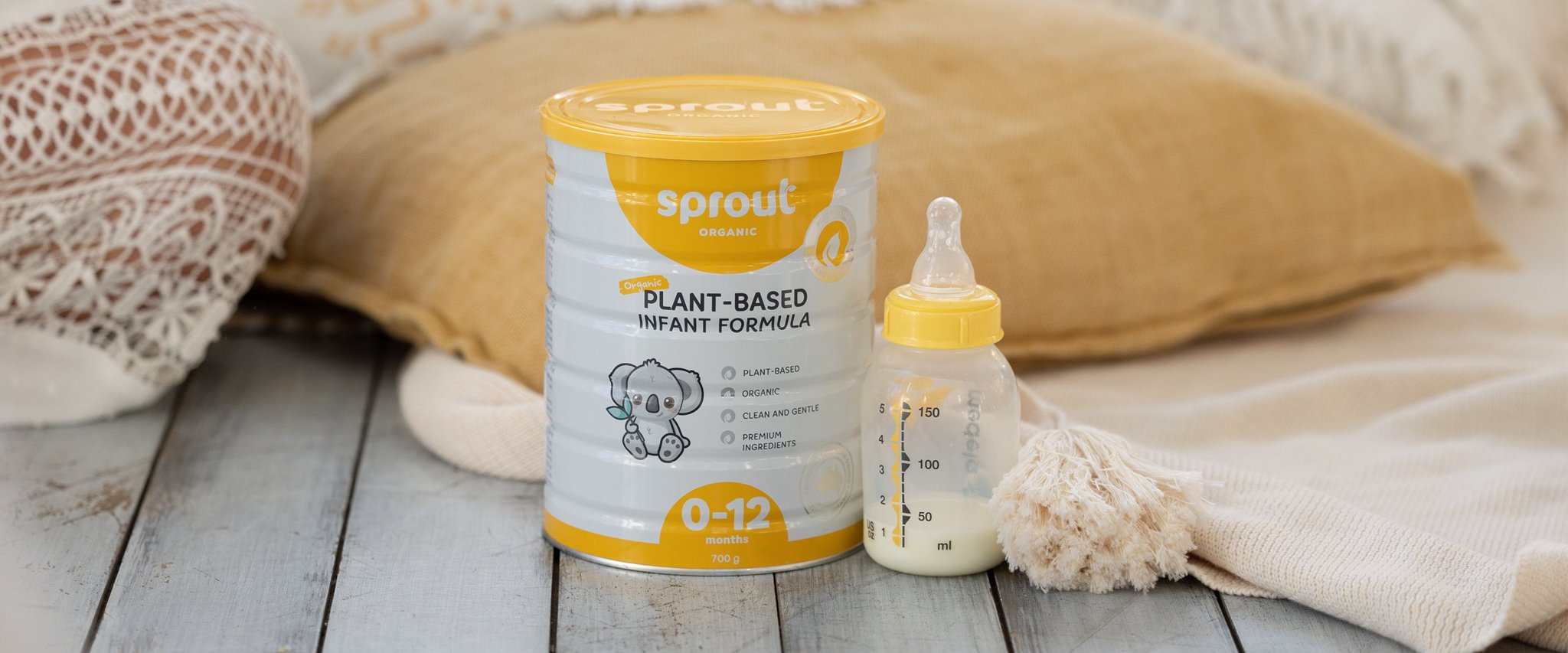Beyond the Myths: Vegan Nutrition for Mums-to-Be
The adoption of plant-based diets, including veganism, is on the rise globally, driven by health, environmental, and ethical considerations. As this dietary shift gains momentum, it's crucial to understand its impact across all life stages, with pregnancy being a period of particular importance. Despite the mass of misinformation out there, having a healthy vegan pregnancy is absolutely possible with proper planning and care.
In this blog post, we'll separate fact from fiction surrounding vegan pregnancies and examine current research, aiming to provide expectant mothers with accurate, up-to-date information to support informed decision-making during pregnancy.
FACT 1: Following a vegan diet during pregnancy is safe
Peak nutrition bodies, including National Health and Medical Research Council (NHMRC) of Australia and The American Academy of Dietetics support a well-planned plant-based diet, including vegan diets across all stages of life. This includes pregnancy.
In fact, the Academy of Nutrition and Dietetics goes a step further, highlighting potential health benefits of plant-based diets, such as chronic disease prevention and environmental sustainability.
It's important to highlight that expectant mothers following an omnivorous diet also need to pay close attention to their nutrition. Many omnivorous diets are often imbalanced and shouldn't be assumed to be superior, especially if they rely heavily on processed foods and lack a variety of nutritious wholefoods.
Similarly, for those following a vegan diet, current research emphasises the importance of nutritional planning and supplementation. Key nutrients that require special attention include:
- Vitamin B12
- Folate
- Vitamin D
- Zinc
- Calcium
- Iron
- Protein
- Choline
- Iodine
- Omega-3 fatty acids (DHA)
What does the research say?
Current research supports the idea that varied, and well-balanced vegan diets, are appropriately safe during pregnancy. In fact, some studies suggest potential benefits including a reduced risk of gestational diabetes mellitus and lower maternal weight gain.
Remember, every pregnancy is unique. Whether you're vegan or not, it's recommended to consult with an accredited practising dietitian, specialised in pregnancy, alongside your healthcare provider to create a personalised nutrition plan that supports both you and your growing baby.
For vegan pregnancies in particular, factors that contribute to positive outcomes include:
- Adequate micro and macronutrient intake (especially, protein, calcium, iron, zinc, iodine)
- Sufficient caloric (energy) consumption (i.e., enough food)
- Appropriate nutritional supplementation (especially, folate, B12, vitamin D, choline, and omega-3 fatty acids)
- Regular prenatal care and monitoring
FACT 2: A prenatal is only one aspect to a well-planned vegan pregnancy
Macronutrients matter:
While prenatal vitamins are important, they're not a one-stop solution for nutritional needs during pregnancy, vegan or not.
Prenatal vitamins focus on micronutrients (vitamins and minerals), but they don't provide macronutrients. A healthy pregnancy requires adequate:
- Carbohydrates: For energy and foetal brain development
- Fibre: For digestive health and blood sugar regulation
- Protein: Essential for foetal growth and development
- Healthy Fats: Crucial for foetal brain and eye development
These macronutrients must come from your diet, not from a supplement.

Not all supplements are created equal:
The supplement market, including prenatal vitamins, is subject to varying levels of regulation. In Australia, the Therapeutic Goods Administration (TGA) oversees lower-risk medicines, including supplements, by restricting them to pre-approved low-risk ingredients. However, for these products, the TGA doesn't evaluate efficacy claims or examine final products and labels before they reach the market. Instead, the TGA may review products through targeted and random surveillance after they're already available to consumers. This approach means that the quality and potency of supplements can vary significantly between brands, with primary oversight occurring post-market. As a result, consumers should be cautious and informed when selecting supplements, especially during pregnancy.
Vegan pregnancies may require additional nutrients that can not be found in all prenatal supplements and may need to be taken in addition. Such as:
- Iron: Essential for increased blood volume and foetal development
- Choline: Crucial for foetal brain development
- Omega-3 fatty acids (especially DHA): Important for foetal brain and eye development
Remember, every pregnancy is unique, and nutritional needs can vary. The key to all healthy pregnancies is a well-planned diet, appropriate supplementation, and regular check-ups with your healthcare provider.
By understanding that prenatal vitamins are just one piece of the nutritional puzzle, you can take a more comprehensive approach to nourishing yourself and your growing baby during your pregnancy.
You can find a comprehensive overview of key nutrients required for vegan pregnancies, alongside appropriate supplementation in our recent blog post: Plant-Based Pregnancy: Your Guide to Thriving on Plants

FACT 3: You can meet the increased protein requirements during the second and third trimester on a vegan diet
In order to understand protein needs during pregnancy, let's first look at how protein requirements change during pregnancy.
- During the first trimester, women typically need about 0.8g/kg/d of protein
- During the second and third trimesters, this increases to about 1.0-1.1g/kg/day
This increase is crucial because protein is needed for the growth of the foetal, placenta, and maternal tissues, especially during the third trimester.
Specifically relating to vegan pregnancies, plant proteins are slightly less digestible and thus you will need to aim for a little more. The exact amount of additional protein may vary, though increasing protein intake by about 10% on a vegan diet is a good guideline. For pregnant women in their second and third trimesters, this would be aiming for 1.2g/kg of protein per day.
Can Plant-Based Diets Meet These Needs?
The short answer is: Yes, Absolutely!
Protein derived from plants can adequately meet pregnancy needs when consumed in the right quantities and combinations. Vegan diets can include a variety of protein-rich foods such as legumes, nuts, tofu, wholegrains and plant-based milk alternatives.
Soy protein can meet protein needs just as effectively as animal protein. While some plant proteins may be low in certain amino acids (like lysine in cereals), including a variety of plant protein sources ensures a complete amino acid profile.
Practical Tips for Meeting Protein Needs
-
Eat a little extra: Include about 25g of protein daily in the second and third trimesters. This could be as simple as adding 1.5 cups of lentils or 2.5 cups of soy milk throughout the day.
-
Focus on Lysine-Rich Foods: Incorporate more beans and soy products to ensure adequate lysine intake.
-
Variety is Key: Eat a wide range of plant proteins to ensure you're getting all essential amino acids.
-
Mind Your Portions: Remember that plant proteins are slightly less digestible, so you may need to eat slightly larger portions.
- Food Preparation: Some cooking methods, like soaking legumes before cooking, can improve protein digestibility.
By understanding your protein needs and how to meet them through plant-based sources, you can confidently navigate your vegan pregnancy, nourishing both yourself and your growing baby.

CONCLUSION:
The Right Approach to Nutrition in Vegan Pregnancies
-
Focus on Whole Foods: Build your diet around a variety of plant-based whole foods to ensure you're getting a wide range of nutrients.
-
Consult a Professional: Work with a registered dietitian who specialises in vegan nutrition and prenatal care to create a personalised nutrition plan.
-
Targeted Supplementation: Based on your individual needs, you may require specific supplements in addition to a prenatal vitamin.
- Regular Monitoring: Have regular check-ups throughout your pregnancy to ensure you're meeting all nutritional requirements. Recommended whether you're vegan or not!
By busting this myth, we hope to empower women to make informed and confident choices about their diet during pregnancy, if they choose to be vegan.
For personalised nutrition and supplementation support, you can find me here or contact me via email at plantbasedfamilynutrition@gmail.com
About the Author: Monica Rundle, is an Accredited Practising Dietitian, and founder of Plant Based Family Nutrition, an online nutrition clinic dedicated to helping families make small, sustainable dietary changes that can make a big difference to their overall health and that of the environment.






Leave a comment